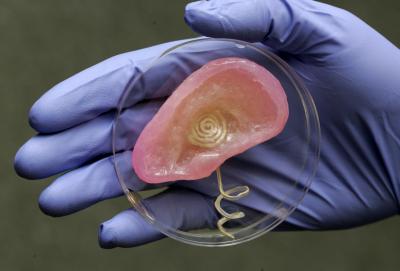Scientists at Princeton University used off-the-shelf 3D
printing tools to create a functional ear that can "hear" radio
frequencies far beyond the range of normal human capability.
The researchers' primary purpose was to explore an efficient
and versatile means to merge electronics with tissue. The scientists used 3D
printing of cells and nanoparticles followed by cell culture to combine a small
coil antenna with cartilage, creating what they term a bionic ear.

